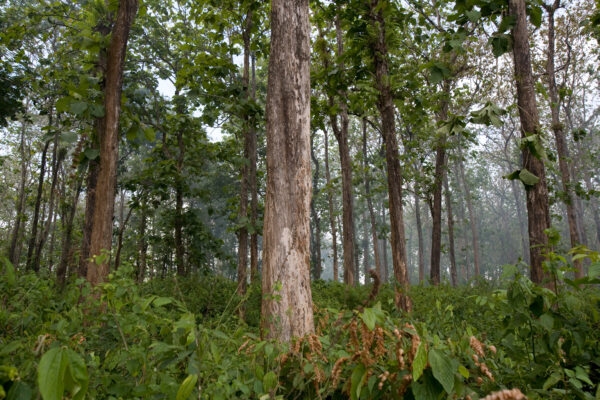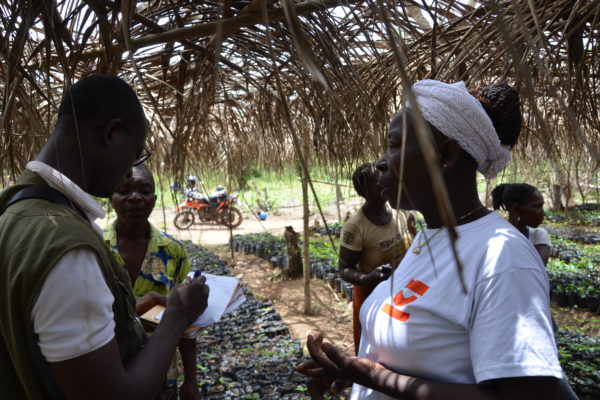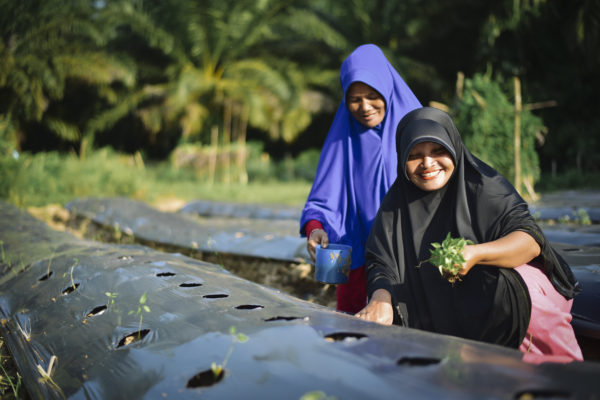TFT’s Jana Nejedla goes on a journey towards FSC merbau wood
It has been almost three years since I arrived in Indonesia and started exploring this incredibly diverse and resource-rich country. Working for TFT enables me to get to the most interesting and remote places, where all products stories start.
On this occasion I had an opportunity to join our Indonesian field team – Agus and Hamid, and TFT UK’s Bjorn Roberts, for a visit to a natural forest concession TFT currently works with in West Papua. For me and Bjorn it was a first time, we knew that visiting Papua is not just a trip, it is the trip. Many times while visiting natural forests in Borneo I have been told that I really have to go to Papua in order to see the most beautiful, pristine forests.
We were all excited about the journey, which began from TFT ‘s office in Semarang, Central Java. Around 14 hours and three flights later we arrived in Sorong – the gate to the birds of paradise peninsula, as well as the oil and gas industry. From there we took an overnight ferry to Sausafor, and finally a local long boat to a small village in Saubeba on the north coast of West Papua, where we got off at the log yard. And there it was, the enormous logs of merbau (Intsia bijuga) proudly showing their identification numbers.
It was the end of April and the Pacific Ocean had calmed down after the previous five months of up to seven meter high waves. By the beginning of May, the first boat can be loaded by 3000 m3 of merbau and transported all the way to Surabaya in East Java, where traders will resell to different industries. One boat will leave every month until the beginning of December when the rainy season starts. Footprints from the rainy season were still visible, as a bulldozer had to pull our four-wheel car our of a muddy and steep stretch of broken road.
We eventually arrived at the base camp on the twenty-seventh kilometre of the main logging road. The base camp has been renovated and new building work on a guest house, warehouse and oil traps were in progress. Improving base camp facilities together with health and safety, HCVF management and Reduced Impact Logging (RIL), Chain of Custody (CoC) were the main gaps the concession needed to work on during their journey with TFT towards better forest management.
TFT Indonesia has been supporting this concession – PT Multi Wahan Wijaya (MWW) with technical trainings and coaching since spring 2013. During our visit, the implementation of RIL, CoC, HCVF management and Health & Safety measures were finalised, but still under improvement. It requires continuous improvement of practices and it needs time for the workers to develop their skills and get used to the new operating procedures.
Everyone – MWW, TFT and The Borneo Initiative (TBI) – the funder of this project, has high expectations and believes that this concession will become FSC certified by the end of 2015 and become the first FSC certified concession in Papua ever. Positive thinking and strong motivation we could feel from the owner as well as management. Overall our whole visit was very friendly and we talked openly about their successes, challenges and difficulties.
The concession is family owned, which might bring restrictions on financial resources and technical equipment, but it might help in the relationship with local communities. Natural forest concessions in Papua very often have difficulties dealing with local communities and managing their financial expectations. This can cause social conflict.
Here we could easily see that the community supports the concession and the company respects and protects their sacred lands, leaves them to hunt wild animals and keep hold of their private gardens. We had a chance to taste their local fruits, vegetables, chili and cacao. We visited their sacred land, walking with the village leader around the forest and river banks in the hope of seeing a giant cassowary bird. Although we did not see any cassowary, we saw many other birds, like Cacadu, parrots, hornbills, as well as other things like tree kangaroo.
These forests are rich in biodiversity and the local communities are highly in favour of its conservation. So it was good to see how the logging management and practices improved in the last year since TFT conducted RIL trainings. We saw trees which were not cut in the river buffer zones, natural regeneration on the skidding tracks, old merbau trees which were not logged this time – their time might come after 45 years of rotation.
The oldest merbau trees had even 190 cm in diameter, could be up to 190 years old. We saw the skidding of 125 years old tree, but on average the logged trees are 70-80 cm in diameter, it never goes under 60 cm.
I have only mentioned merbau trees, but the forest is full also of other species – matoa, nyatoh and many others. The problem is that any other species except merbau can be logged and transported much cheaper from Kalimantan and thus there is a demand only for merbau from Papua, which can’t be found anywhere else in Indonesia. Merbau coming from pristine forests of Papua and being target of illegal logging, this exotic wood became for a reason a concern of environmental NGOs that merbau could disappear from wild in the next 35 years. Getting MWW certified is a step forward in merbau’s protection and reputation of this hard wood species.
On our way back from the log yard at the ocean, the wildlife in the concession was showing us its face in its early morning glory. The views were also spectacular. Although we spent only three days there, it was full of some many new encounters it felt like at least a week, but at the same time not enough to leave yet. Maybe ironically the biggest adventure we experienced on the way back, during the long boat taking us from Saubeba to Sausafor.
The waves were much bigger than three days earlier and the fully loaded boat had difficulties to float through them. In one moment everyone was holding tight to the boat’s fragile wooden construction and taking on life jackets. Not only thanks to the adventure at the end, it was a strong and unforgettable experience from this beautiful and forested end of the world. I hope that I will be able to visit there again next year and witness the logging of the first FSC certified merbau in Papua.


